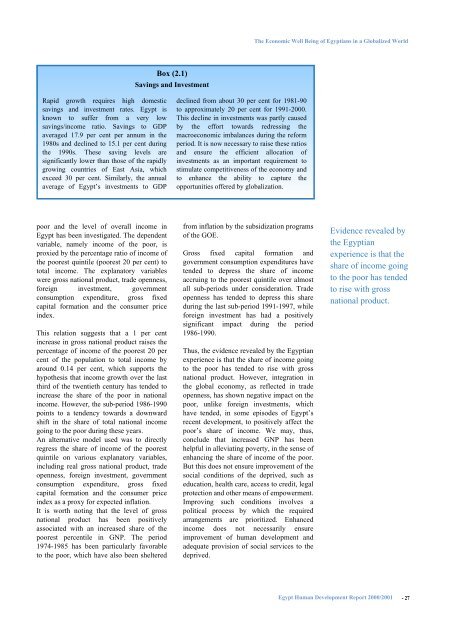English - Human Development Reports - United Nations ...
English - Human Development Reports - United Nations ...
English - Human Development Reports - United Nations ...
You also want an ePaper? Increase the reach of your titles
YUMPU automatically turns print PDFs into web optimized ePapers that Google loves.
The Economic Well Being of Egyptians in a Globalized WorldBox (2.1)Savings and InvestmentRapid growth requires high domesticsavings and investment rates. Egypt isknown to suffer from a very lowsavings/income ratio. Savings to GDPaveraged 17.9 per cent per annum in the1980s and declined to 15.1 per cent duringthe 1990s. These saving levels aresignificantly lower than those of the rapidlygrowing countries of East Asia, whichexceed 30 per cent. Similarly, the annualaverage of Egypt’s investments to GDPdeclined from about 30 per cent for 1981-90to approximately 20 per cent for 1991-2000.This decline in investments was partly causedby the effort towards redressing themacroeconomic imbalances during the reformperiod. It is now necessary to raise these ratiosand ensure the efficient allocation ofinvestments as an important requirement tostimulate competitiveness of the economy andto enhance the ability to capture theopportunities offered by globalization.poor and the level of overall income inEgypt has been investigated. The dependentvariable, namely income of the poor, isproxied by the percentage ratio of income ofthe poorest quintile (poorest 20 per cent) tototal income. The explanatory variableswere gross national product, trade openness,foreign investment, governmentconsumption expenditure, gross fixedcapital formation and the consumer priceindex.This relation suggests that a 1 per centincrease in gross national product raises thepercentage of income of the poorest 20 percent of the population to total income byaround 0.14 per cent, which supports thehypothesis that income growth over the lastthird of the twentieth century has tended toincrease the share of the poor in nationalincome. However, the sub-period 1986-1990points to a tendency towards a downwardshift in the share of total national incomegoing to the poor during these years.An alternative model used was to directlyregress the share of income of the poorestquintile on various explanatory variables,including real gross national product, tradeopenness, foreign investment, governmentconsumption expenditure, gross fixedcapital formation and the consumer priceindex as a proxy for expected inflation.It is worth noting that the level of grossnational product has been positivelyassociated with an increased share of thepoorest percentile in GNP. The period1974-1985 has been particularly favorableto the poor, which have also been shelteredfrom inflation by the subsidization programsof the GOE.Gross fixed capital formation andgovernment consumption expenditures havetended to depress the share of incomeaccruing to the poorest quintile over almostall sub-periods under consideration. Tradeopenness has tended to depress this shareduring the last sub-period 1991-1997, whileforeign investment has had a positivelysignificant impact during the period1986-1990.Thus, the evidence revealed by the Egyptianexperience is that the share of income goingto the poor has tended to rise with grossnational product. However, integration inthe global economy, as reflected in tradeopenness, has shown negative impact on thepoor, unlike foreign investments, whichhave tended, in some episodes of Egypt’srecent development, to positively affect thepoor’s share of income. We may, thus,conclude that increased GNP has beenhelpful in alleviating poverty, in the sense ofenhancing the share of income of the poor.But this does not ensure improvement of thesocial conditions of the deprived, such aseducation, health care, access to credit, legalprotection and other means of empowerment.Improving such conditions involves apolitical process by which the requiredarrangements are prioritized. Enhancedincome does not necessarily ensureimprovement of human development andadequate provision of social services to thedeprived.Evidence revealed bythe Egyptianexperience is that theshare of income goingto the poor has tendedto rise with grossnational product.Egypt <strong>Human</strong> <strong>Development</strong> Report 2000/2001 - 27
















